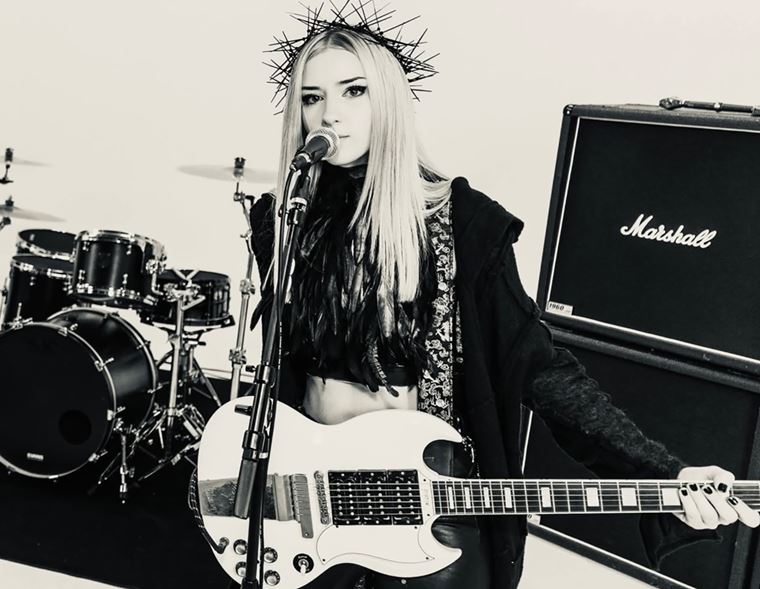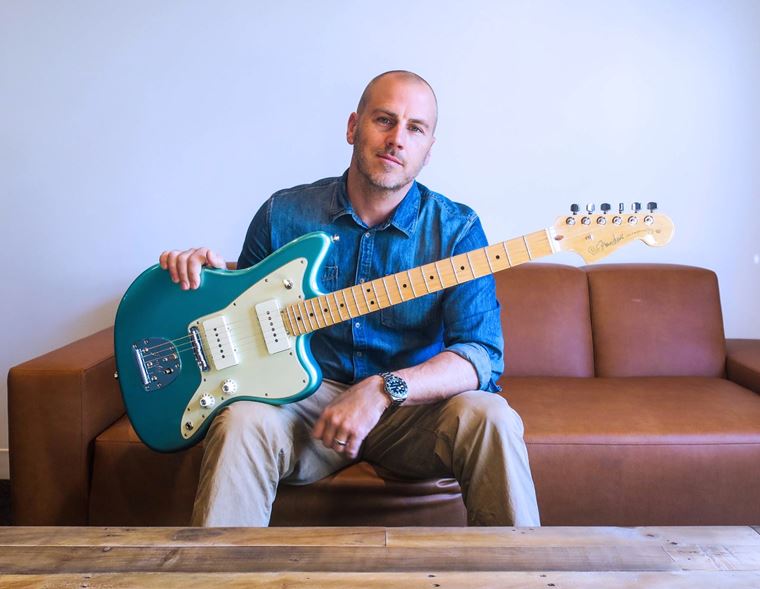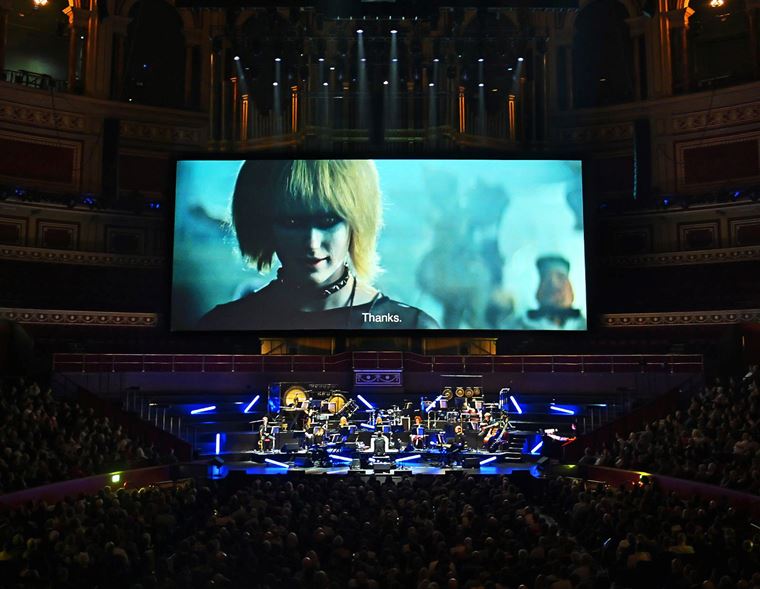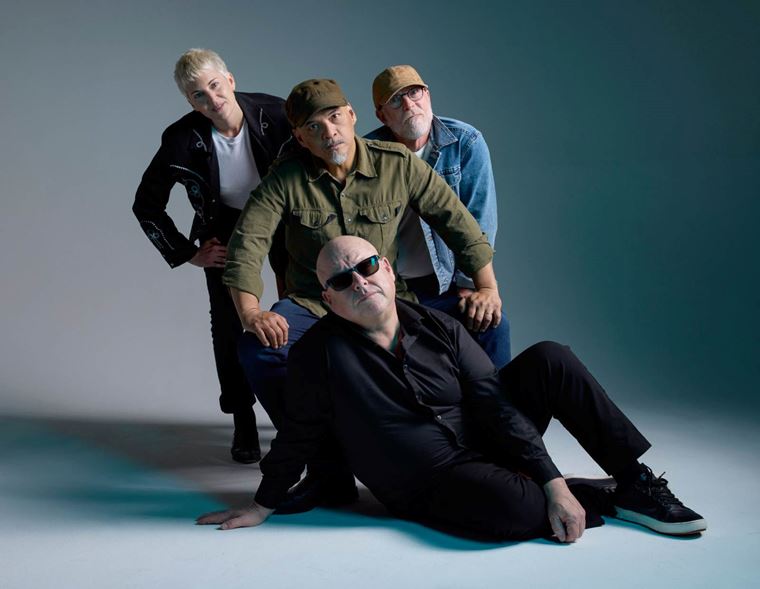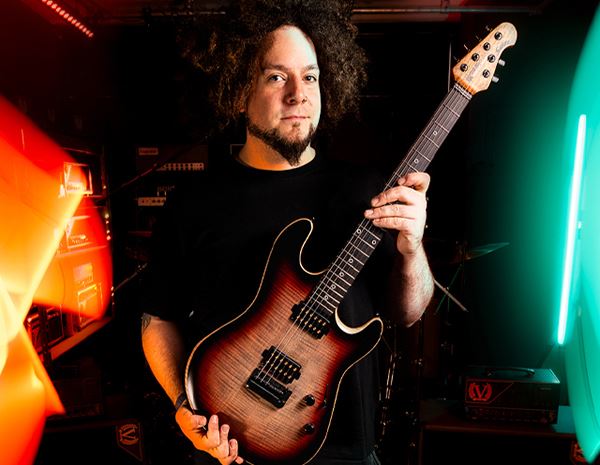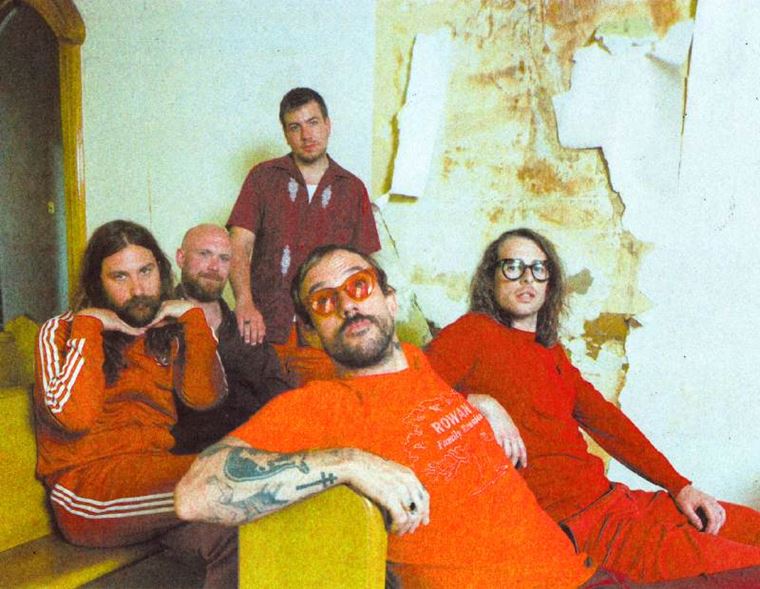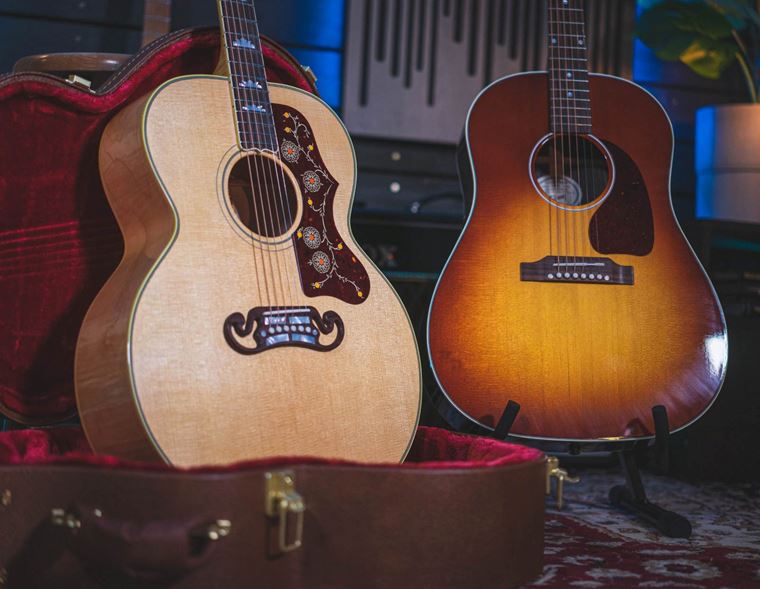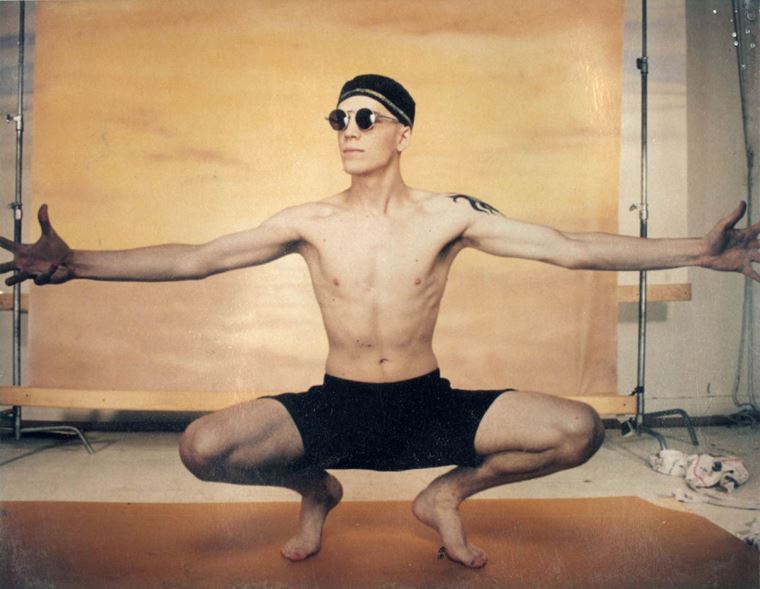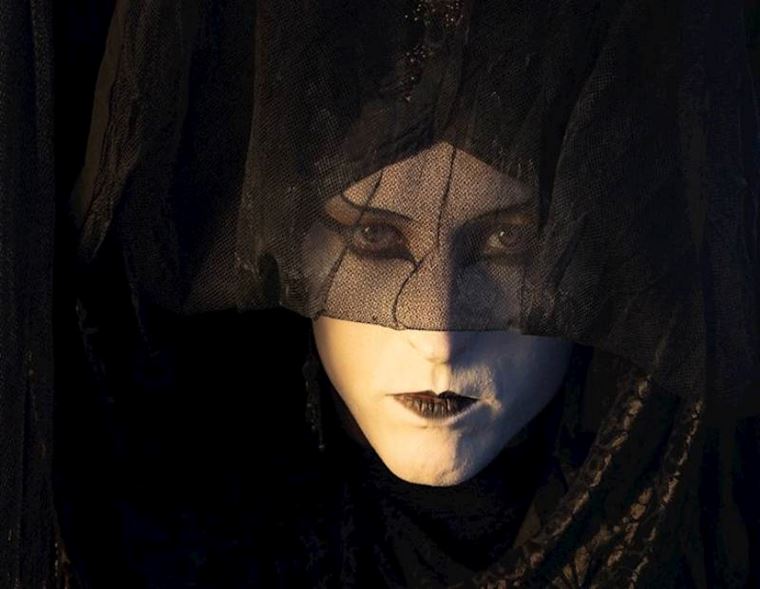Marillion Interview: Steve Rothery talks Tone, Touch and Inspiration
Published on 28 October 2022
Marillion are an inspiration. Managing to make a go of things in music is a rough, stormy ride at even the best of times, so just imagine keeping wind in your collective sails for over 40 years? Now imagine losing your famous singer after the first four albums, and then doubling down with a ‘new guy’ who is still going strong after 32 years’ service? NOW imagine doing all that, and maintaining one of the most famously loyal and passionate fan bases in the business? It’s all quite unreasonably difficult to achieve, frankly. Then, on top of that mountain, you add in the small fact that the band’s last two albums have in fact been some of their most successful ever, and you’ll start to appreciate the reality of Marillion’s contributions to music.
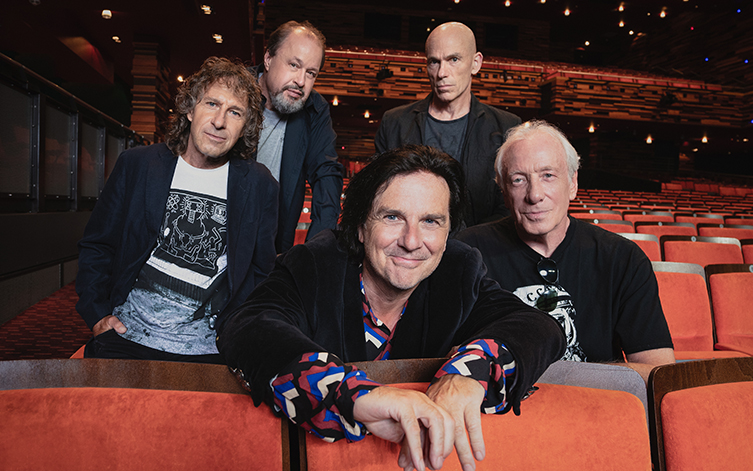
(Photo: Ann-Marie Forker)
They’ve kept at it through the major label hysteria, through the lean years, plotting a course of adventure that is ever-onward, into uncharted territories and even inventing the motion of crowdfunding during the way. It’s been some journey for sure, and guitarist Steve Rothery is more than aware of that. Ever humble and amiable, Rothery is, in fact, one of the UK’s greatest players, something that seems to often go unnoticed.
We spoke to Steve on the phone a few years ago (please click through to read our first Steve Rothery Interview) and had a great time with him, so we jumped at the chance to head backstage at Marillion’s Glasgow show to chat to Steve in person. In the three years since we’d spoken, the world had gone through some changes, to say the least, and the band had released the excellent An Hour Before It’s Dark to overwhelming critical acclaim. In short, there was plenty to talk about, as you’ll find in our fully transcribed interview below. We covered a lot of subjects, including some quite in-depth detail into the band’s writing methods, their fantastic rehearsal space/studio, and some particulars about Steve’s approach to playing. Throughout, Steve was a gentleman: always happy to respond in detail to whatever was asked, from techniques to gear and everything in between.
Steve Rothery Interview
guitarguitar: So, we spoke on the phone maybe three years ago now.
Steve Rothery: Ah, ok.
GG: So, we’ve already covered a lot of the guitar rigs bits, but even so, it’s been three years! Things might have changed, plus there’s the new record. One of the things I’d love to talk about is your ‘guitar moments’, as I’d call them: the breaks where the guitar really leads the song.
SR: Yeah, I think we maybe built more of those in, on this record. Mike Hunter (Marillion’s long-time producer) took a slightly different approach; it’s more guitar-centric because there’s a lot more power chords than I’d have normally on most tracks. The way the songs are evolved, we usually do most of the writing by jamming, so every time we did a song, I’d try something a little different sonically. Mike took all of these moments and managed to shoehorn them into the track, which kind of affected the development of the track. Whatever other people did on top of that in terms of orchestration - or even vocals, sometimes - so it’s all very interactive.
GG: You touched on a few things there that I wouldn’t mind delving into, because when we spoke before, you mentioned about jams being a big part of the writing, and presumably you all bring in ideas of your own?
SR: Sometimes it's just what happens in the room, in the moment. I mean, sometimes things have evolved a bit when I was working from home during the pandemic. A lot of the guitar solos were recorded at home in my garage! I have a Pro Tools system there and more equipment than most music shops (laughs), so yeah, the solos on Care and Crow & Nightingale happened in my garage!
GG: Aha! It’s uncanny that you mention that because of the whole record, the two that I wanted to talk about were Crow & Nightingale and Care!
SR: Right!
GG: So, if we take Crow & Nightingale, there’s a beautiful solo near the end of the song. You’ve kind of answered it but we may as well be specific: how much of that is you improvising in the moment and how much is pre-written?
SR: It’s all improvised! But I do maybe two or three takes. I mean, it’s 95% one take, but there might be a bit where I think ‘that meanders a bit’, so I’ll chop it into this previous take for six or eight bars. But no, it’s just reacting to the music, really! Sometimes the lyrics haven’t been written by that point! Whatever the music is implying or lends itself to, you can write something to complete it in some way. It’s quite special when you do that and you hear the additional layer being put on it like with the choirs on this album, you know? You have something that you think sounds really good, and then you get something that’s like ‘Oh my god!’ (laughs) That’s a very satisfactory moment.
GG: I bet! I wasn’t sure if those choirs were real or extremely good plugins, since technology is at that point nowadays where the lines have really blurred.
SR: Oh, it’s real people, yeah. They did an amazing job.
GG: Oh yeah, that song Care has a great choral bit at the start. That tune has, about a minute and a half in, a really simple guitar part that’s also a really big moment.
SR: Yeah, that’s an idea that’s been kicking around for fifteen years (laughs) that we could never find a place for! So, it’s quite satisfying again that it can have its time. It’s quite a simple phrase. I mean, a lot of what I do is quite simple but it’s the expression, and sometimes simple melodies are the best, really.
GG: Often!
SR: Yeah!
GG: I think that technique can be beside the point, in a lot of ways. Certainly compared with expression, wouldn't you say?
SR: Absolutely, yeah! My whole philosophy is that it's all about expression. Even my hand position is down to where I have maximum control of vibrato and bending than it is for any fast legato stuff. A simple melody played with maximum expression is gonna reach people a lot more than a widdle-fest, really. That might impress other guitarists, but most of the audience will just go (mimes yawning).
GG: Yeah. Do you think that’s one of the things that keeps the Marillin fans coming back? They’re famously passionate, and they return to the records for 20 and 30 years. Is it because, when there’s a gap in the music and there’s a question about how to fill it, you choose to fill that gap with something that’s emotional?
SR: Yeah. I think what we do is quite unique. I mean, we have been ignored by the mainstream press for a very, very long time (laughs) but we are used to it and we don’t mind, because it gives us the freedom to follow whatever path we wanna take. I think, because of that, that maybe our music will still be listened to in 20 years’ time, where maybe some of the more trendy artists have fallen by the wayside. It’s very hard to have a crystal ball with that sort of thing.
GG: Sure.
SR: But I am proud of every record that we’ve ever done. There’s a consistency to our albums: I mean, for a band to produce an album as strong as this 18 albums into their career, I can't think of another artist that’s done that, really.
GG: Certainly not.
SR: So, that shows how much passion we still all have for music, and what a great chemistry we all have together. We can still put those rabbits out of the hats!
GG: Yeah, and that’s even going beyond what was achieved by your early heroes like Pink Floyd and Genesis: they had their years when the potency was there, and then things fell apart. You guys have managed to last past all of that.
SR: Yeah, I think it’s because there’s so much creativity within the band. We finished up quite often with ideas that don’t make the records, because you can only fit so many ideas on a record. Sometimes they get used on subsequent records, and sometimes never! But I think with some artists, they have one or sometimes two main writers, and once they’ve kind of like, I dunno, expressed everything they want to say, it’s like they don’t have that chemistry and the bouncing ideas off each other thing happening. It’s all down to that one main writer. So, I think we have that advantage of everybody being incredibly creative. It’s almost like we take it in turns to be the leader of a certain musical section, which just works really well for us, I think, to have that within the band.
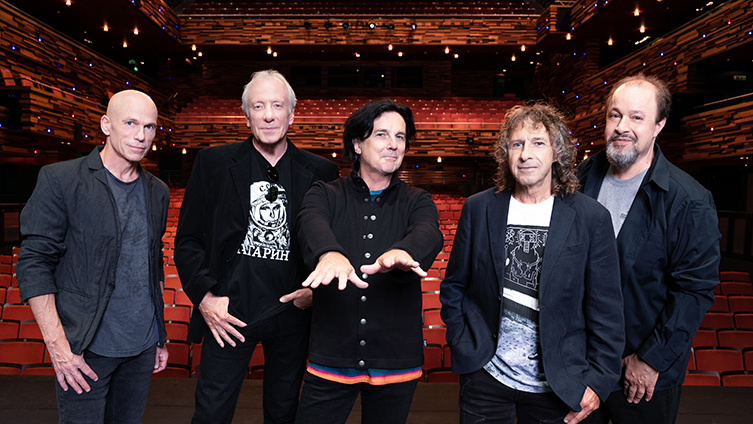
(Photo: Ann-Marie Forker)
GG: Indeed! For example, off the top of my head, I think Bono writes most of the songs for U2 to at least some degree (this may or may not be true, but it served as an instant context: Ray).
SR: Yeah.
GG: If Larry Mullen Jr said, ‘Well, I’ve got a bunch of songs!’, then cool, but all of a sudden the band doesn’t sound like U2 anymore!
SR: Exactly, yeah!
GG: So, the reason Marillion works is somewhat because it’s 20% in from each of you.
SR: We all add something quite unique and special. You take one of those five elements away and it could still be very good but it wouldn’t be the same.
GG: So, when you are all jamming and coming up with ideas, of course it’s going to be different from song to song, but given that the lead vocal is arguably the most important part of a song, quite often your guitars are supportive, or play counterpoint to the main melody.
SR: Yeah.
GG: How quickly, within those situations, does the vocal have to be there before you start doing that?
SR: There has to be something there that I can use as a basis, but for me, the trick is it’s like a dance you do around the vocal melody so you’re not fighting it, you’re enhancing it. You’re basically giving it a second ‘hook’, as much as the vocal melody is a hook. You do something that may change more frequently or have a different shape to the vocal melody, but it doesn’t get in the way of it. It kinda builds the emotion in the track.
On The Great Escape from Brave, there’s parts in the middle section and the last ‘falling from the moon’ section when the guitar is doing that: it’s weaving around the vocal melody. But, just to go back to the writing, the style of jamming really evolved over the last 20 years of the band’s career. In the Fish years, I used to write probably 85% of the music, and that changed when Steve joined. Season’s End (first post-Fish Marillion album with Steve Hogarth on vocals) and parts of Holidays in Eden still were a lot like that. Then, maybe from the Brave album, it became more of a band kind of writing process. Steve’s a great piano player and songwriter as well as being a great singer, so that’s how that aspect of the band evolved over the years, to get us to this point today. We don’t have to argue about what’s good (laughs), we just jam it all and then Mike Hunter, our producer, will sift through for the nuggets of gold, really.
GG: Mm, yeah. That’s quite a thankless task for a lot of producers, but if you’ve got good stuff, it’s kind of exciting as well, isn’t it?
SR: Oh yeah! I mean, it would drive most people insane! I actually think it has driven him insane at times! (laughs)
GG: haha, I can imagine!
SR: Fortunately, he’s come back!
GG: Now, I don’t know if it’s strictly correct to say ‘call and response’, but it feels to me that a lot of the time, your melodic guitar is answering the vocal. An example might be on Hotel Hobbies from back in the day. It’s almost like you’re finishing the vocal line, or even providing an in-between segue?
SR: Yeah, it’s just an instinctual thing, really. Feel wherever the spaces are. I think one of the most unusual things about what I do - apart from the bending and vibrato being so important - is that rhythmically, I try to find not the most obvious spaces to start a phrase. Again, that’s that idea of it being almost like a dance around the vocal melody: finding places where it’s not gonna fight that, but it’s gonna enhance it in some sort of way.
GG: That’s a really good way of putting it, I love the idea of dancing around the melody. Do the other members have a say, or maybe comments like, ‘Steve, that’s a bit too much’, or ‘Steve, it needs a wee bit here’?
SR: Never!
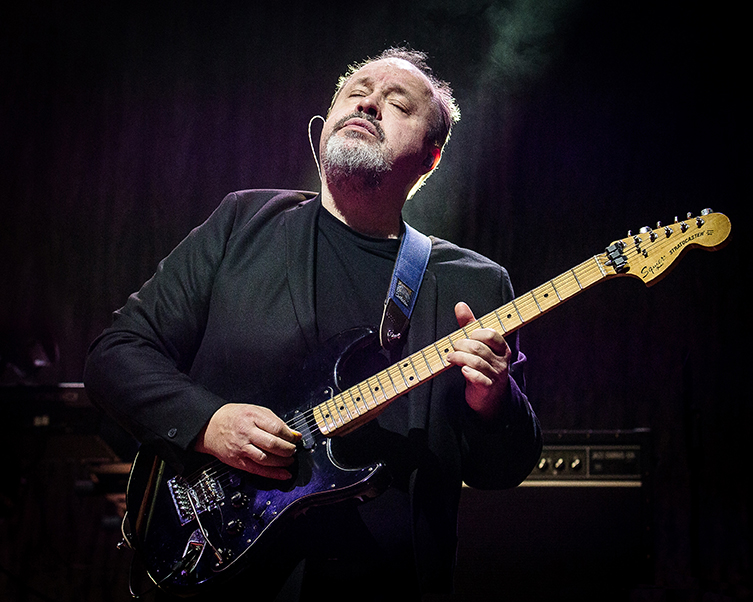
(Photo: Ann-Marie Forker)
GG: Haha, oh brilliant!
SR: (laughs) The only things I really get are compliments, I’m glad to say! On the last album, the solos on Crow & Nightingale, for example. It still baffles us all, really, where it all comes from, but I think we’ve all got a lot of respect for each other’s abilities. That’s the thing that keeps us going. What we do, it’s not like it’s a complex thing, it’s not like a Dream Theater muso-tastic kind of thing, it’s a lot more subtle than that. It’s a lot of…not simple, but maybe not overly complex parts that mesh together and create something as a whole that sounds very rich, melodic and atmospheric. At the end of Care it’s such an emotional moment, and when we played it live at the Marillions Weekends, you see the audience with tears streaming down their faces! The music has that power to reach people so deeply, if it’s a lyric they can relate to. A lot of people did, with that. It’s an incredible feeling to have that effect, for it to mean that much to people.
GG: For sure, that’s the part about the angels?
SR: Yeah.
GG: Yeah it’s phenomenal. Now, I don’t mean to say I disagree about your stuff being ‘simple’: we both know it’s not, it’s just not Dream Theater-complex, as you say…
SR: It’s like a different branch of the guitar evolutionary tree, really! (laughs) All the players who excited me - Dave Gilmour, Steve Hackett, Andy Latimer - they all had something in common in terms of an emotional thing, an atmospheric thing and a certain power. For me as a young kid growing up in Whitby, North Yorkshire, discovering music when I was 15 really, and was starting to play the guitar, that’s what resonated with me.
GG: Yeah, and Whitby of course, that’s where your atmosphere comes from, right?
SR: Well yeah! Some of the little bits of folk influence that comes through in what I do from time to time definitely comes from growing up there. I wasn’t born in Whitby, but I lived there from when I was 6 to when I was 19, when I moved out to join Marillion.
GG: Such an important time for anybody.
SR: Yeah, and they had this yearly Folk Week in Whitby where everywhere in town there’d be folk musicians performing in every street corner and every bar. I think that soaks up in an almost subliminal way.
GG: I think it does as well. I don’t know whether you’d agree that being coastal when you’re young gives you a different sense of atmosphere? I’m not quite sure what, but it seems that a lot of musicians from the coast get that.
SR: Yeah, maybe! Maybe it’s the power of the sea? I always remember the stormy nights, there’s just something about that sea; it’s such a wild force of nature. It’s really funny, because I grew up in Whitby, I was 15, listening to Genesis Live and about a year ago - Steve Hackett’s a really good friend of mine, him and his wife Jo - and we went up to Whitby. I was showing him around, showing him all the places where I grew up when I was 15 and listening to him! It was quite a surreal thing!
GG: That’s incredible!
SR: If you could’ve said to 15-year old me that 47 years later, you’re gonna be showing this guy around town, I mean…
GG: He wouldn’t believe you! Haha!
SR: Yeah!
GG: Steve Hackett’s a lovely, lovely man.
SR: He really is! Steve and I are supposed to be doing an album together.
GG: Oh yeah?
SR: We’ve been talking about it for the last 6 years. We’ve done a couple of little recording sessions, but hopefully next year we’re going to get the chance to do something.
GG: Instrumental, like Ghosts of Pripyat?
SR: Maybe! I’d prefer it to be instrumental. I think in some ways it’s a limitation but it also frees you from all those questions about lyrics and vocal styles, things that have to be so right, in my opinion, for it to really work. If it’s instrumental, it simply works or it doesn’t.
GG: Sure, sure. Oh, that’ll be nice! Since we were speaking of Steve Hackett, let’s segue onto guitars! I’m really interested in your current touring setup versus what you might be using to record, but the ones I really want to know about first are of course your famous black Squiers! They are now 40 years old!
SR: Yeah! I got that one second hand from Chandler’s Guitars when my main guitar that I used on Misplaced Childhood was having some problems. I got it just before Clutching at Straws, so in ‘85 or ‘86 we got this second hand Japanese Squier for I think was 150 or 160 quid!
GG: Bargain!
SR: Yeah, really! I put EMG SA’s on it, put a Kalher locking tremolo on it and that’s been on albums that’ve sold, I don’t know, 6 or 7 million copies over the years, so that was pretty good!
GG: A good investment!
SR: I’ve never been a snob when it comes to that. For me, that little transfer on the headstock is the thing that makes the least difference. It’s all about the quality of the wood, the construction, the quality of the electronics. If you’re changing some of that stuff anyway, and you’re starting with a great piece of wood…
GG: Yeah, oh, they’re famous now, those Japanese Squiers from the 80s. They were putting the American Fenders to shame at the time.
SR: Oh, they were. I had an American Fender, it was the first proper guitar I bought when I was 17. I had a motorbike that never worked, fortunately or it would’ve killed me, and I sold that and got a second hand Fender Strat. I never got on with it: it wasn’t a great one, the neck was slightly twisted so I sold that and got my first Yamaha SG2000. That’s what I had when I joined Marillion.
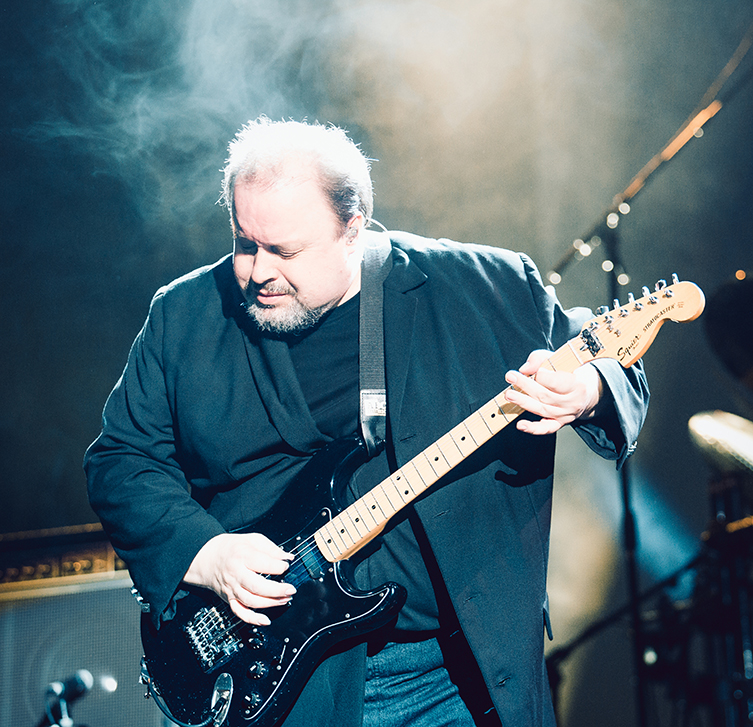
(Photo: Ann-Marie Forker)
GG: See with your Squiers: not because they are any different from any other vintage guitars, but do they need more looking after, or are they still pretty much kicking ass?
SR: No, they’re absolutely fine! My two main guitars are that one and every album from 1991 onwards is my (Levinson) Blade Strat, an RH-4. Again that is just one in a million. You can’t get a bad sound out of it, it’s incredibly versatile, incredibly stable and those two guitars are what I do 95% of my live work with.
I also use my Blade Telecaster, I think, for those solos we talked about.
GG: Oh, okay! So, the Tele’s more of a solo instrument for you?
SR: Not really, it’s just that’s what I had in my studio! (laughs) But I’ve got various guitars, some with P90s on…I’ve got a Les Paul kicking about somewhere, but it’s not been out it’s case for about thirty years! The Blade is my go-to because it’s so versatile. It’s two single coils with a mid boost that’s switchable and a humbucker, so you have all these choices about how hard you push the front of the amp.
GG: Yeah.
SR: Then the way my signal flow works is I use a Gig-Rig pedal - a G2 or a G3 - to control how hard the input of the preamp is being driven, and then boosting the level to compensate for that if you’re kind of cleaning up. A Groove Tubes Trio is the main preamp that I use.
GG: Ah, interesting! Last we spoke, it was perhaps in relation to your classic lineup being a Roland Jazz Chorus with a modified DS-1.
SR: Yeah, that was the setup all the way through to - and including parts of - the marillion.com album. Some of the effects have changed, like I used a (Roland) GP-16 for a while, but it was mainly a TC 2290 delay with a DS-1 and a Roland Chorus, into a quadraverb for all of the Marillion stuff up until about 1997-98. Then I switched to using the Blade with a Groove Tubes Trio preamp and a Lexicon MPXG2. My third one finally died, I think, so I’ve had to replace elements! I’m using stompboxes to give me those elements, including something I just bought from one of your branches, actually!
GG: Oh! Thank you!
SR: The reverb with the faders, like a Lexicon in a box. It’s the Chase Bliss CXM 1978.
GG: That’s a stupendous pedal!
SR: My friend Daniel Steinhardt from Gig Rig had one on his Pedal Show and I thought it was such a cool idea because you can instantly see all the different levels like mix, diffusion etc. Sometimes it’s so handy because I hate deep-diving through menus to get to what I want to do! All of my 2290’s have died too, after touring for years around the world, but I use the Free The Tone Flight Time, which is like a 2290 in a box. It’s exactly the same. I want to go in and alter the time or filter the delay and that lets me do it in about three button presses. That’s what you need in a creative situation, as opposed to (mimes messing about with submenus on some old rack system).
GG: Delays are really important to your sound for creating atmosphere and for playing off of too, right? Presumably you’re not one of these people who plays everything dry and then adds the ambience afterwards?
SR: No, I think, even if you’re worried about how much delay you’re recording with, you should always have some delay on there, just for the way it affects the sound. Even if you add extra delay later before you bounce it down and send it to the producer, as I sometimes do. There’s a lot of really fancy delays and I’m addicted to buying pedals. My wife’s very understanding! My good friend Dave Foster, who plays with Big Big Train and also in my solo band, he has the job of selling the stuff that I buy, try and go ‘nyah’! (laughs) The amount of delay pedals I’ve bought over the years! But the Free The Tone stuff I absolutely love.
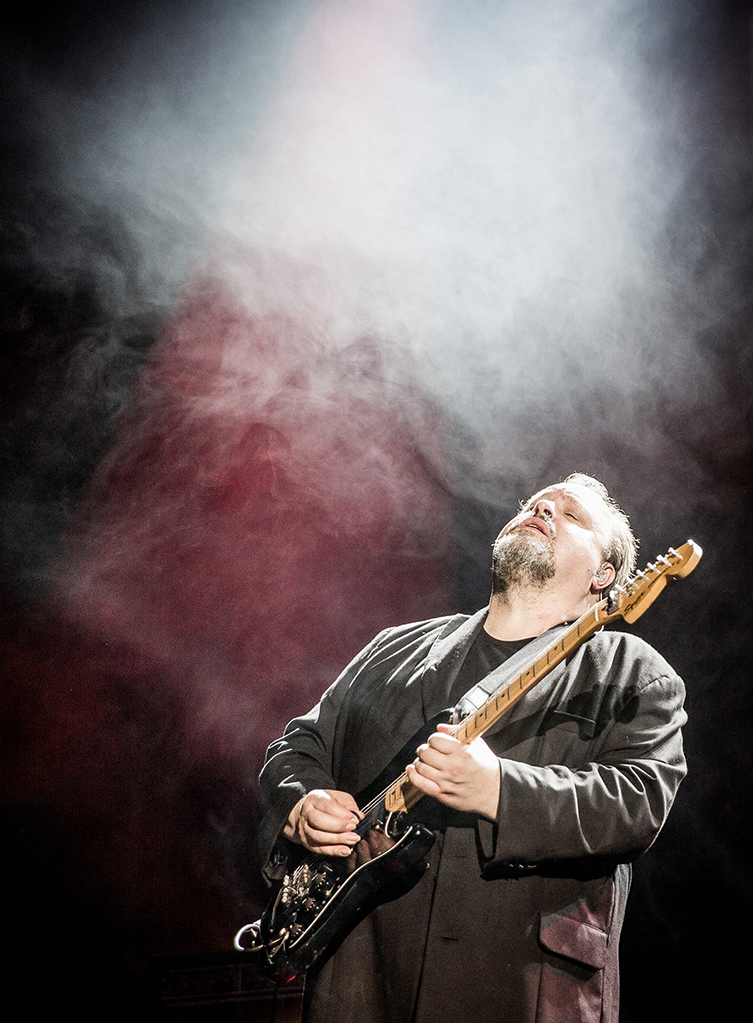
(Photo: Ann-Marie Forker)
GG: So, the key for your delay sound, just generally speaking: do you use two different delay times?
SR: No, it’s normally just a single delay, somewhere between 380 and 450 milliseconds, occasionally longer depending on the song. For me, with delay, you almost shouldn’t really be aware of it, unless you’re The Edge and you’re playing the delay, then it’s something that’s just doing a job: it shouldn’t dominate the sound. That’s what was always great about the 2290s, which is true of the Flight Time, is you have the pure tone of the guitar coming through. I guess you’ve got an analogue pass for the signal that’s mixed in with the digital delay. It should almost be creating a halo around the sound.
Again, with reverb, sometimes I don’t use reverb at all, but if I do it’s usually just to give it a little bit of space around the solo sound. A lot of people really overuse effects, I think.
GG: Uh-huh, exactly! In terms of your live sound, do you have a dry signal that goes to the front-of-house, or is it all just wet?
SR: No, I just give ‘em what they get.
GG: What we hear is what you’re doing.
SR: Yeah, I mean some people I know have that whole wet/dry/wet thing and I think that, in a way, it’s maybe more inspirational for a player to hear that huge sound field, but the out-front guy’s not really gonna give a damn. I mean, he’ll maybe just take your dry signal and as much of either side of the wet as he thinks works, and I don’t think you should give that choice to the engineer! (laughs) You decide what works for you, and this is what you get!
GG: Quite right! Now, I was going to ask about working with Mark Kelly playing keyboards, and whether you have to compromise your parts so that everything fits, but we’ve somewhat covered that already.
SR: Yeah, we just do different things, really!
GG: Yes, you compliment each other. Okay, one thing I thought would be interesting to ask, and I know you’ve got solo work and so on, but still: Marillion has been an almost constant lineup for 40 years, certainly if you take the vocalist out of it. You’ve played with the same people for that long, so is it a strange feeling when you play guitar with a whole different set of people?
SR: It depends! I don’t know if you know my solo album at all, but my solo band are all great players and lovely, lovely people. We have a different chemistry to Marillion but it’s still equally as valid. There’s just a joy to play with, really. That’s like going off on holiday with your mates, when I tour with them! Martin, the singer, is from Glasgow, so he’ll be here tonight.
.jpg)
(Photo: Ann-Marie Forker)
GG: So, there’s not too many strange adjustments? You just do your thing regardless?
SR: No because the Ghosts of Pripyat is a lot more of a guitar-led album, because it’s all instrumental. So, you know, you just have to have the right musicians. Again, going back to this thing with Steve Hackett; that’s something we've talked about on and off over the last however many years, about which other musicians we’d use. So, you’ve got to find the right chemistry again, even if it’s a different chemistry.
GG: So it’s just chemistry.
SR: It is, really. With my other project, The Wishing Tree, again, it was just finding stuff that works, really. Good communication.
GG: So, you did touch upon this earlier, and I wouldn’t mind posing the question a little more specifically. Marillion in the early 80s kind of retrospectively saved prog from where it was going after punk destroyed it.
SR: Yeah.
GG: So, you also invented crowdfunding.
SR: Yes.
GG: That’s given the music industry somewhere to go that it wouldn’t have been able to go to otherwise. That direction didn’t exist before you guys did it. Given all of that, and the fact that Marillion is a significant band, do you ever get frustrated - and I know you said you were okay with it - but is there a frustration and an annoyance that the music world at large does seem to underappreciate or under-represent or underrate you?
SR: Yeah, it’s always been that way, I suppose. The last album (F.E.A.R., released in 2016) had pretty reasonable chart success around the world, top 5 in most of Europe. But I suppose when you play music that’s not pop music and not whatever the currently trending rock music is, it’s not exactly retro but I’d say it’s more timeless. When you think of how many people have Dark Side of the Moon, you just know that a lot of those people would love us if they ever gave us a chance, which they probably never will. It’s something you just have to deal with, but in a way it also gives you freedom. The more successful you are - and we’ve been there with platinum albums and selling out stadium tours - it creates a lot of pressure, a lot of expectation, and a lot of people wanting you to work to death in order to cash in while they can! (laughs)
So, having a certain level of fame and income where you can live comfortably and have the freedom to do whatever the hell you want, and enjoy it, in a way it’s a sweet spot.
GG: Yeah! It’s kind of actually one of the best ways to be as a musician.
SR: It is, really! We have our own studio - we don’t own the building - but still, it’s somewhere we can write, record, store our equipment. The whole web office and management office is there.
GG: Is that the Racket Club?
SR: Yeah.
GG: I’m so interested in the Racket Club! It seems like a great idea. Do you guys do, like, Monday to Friday hours?
SR: Not unless we’ve got something like rehearsing for this tour, two weeks before. We’d go in and set up, but even with that, sometimes you can’t really do much more than four or five hours a day because you’re just so frazzled after that. But it’s just a great thing to have, and every album since Afraid of Sunlight has pretty much been recorded there.
GG: Really?
SR: Yeah! I mean, sometimes we go down to Real World Studios because it’s got a great vibe, great acoustics and it looks good on film!
GG: The champagne of studios!
SR: Most of the work is done at the Racket Club.
GG: I have no idea what it’s like, but my mental picture is amazing, haha! Like a clubhouse for adults.
SR: Yeah!
GG: So, my last question is relatively difficult to word, though it’s hopefully an easy one to understand. Certainly the last two records have done particularly well, but there is some quite serious subject matter on there, some heavy stuff compared to…well, there’s always been heavy themes and subjects with Marillion, but these two albums were maybe more pointedly heavy in that way. But musically, there’s always something to uplift: there’s redemptive qualities there. Is that important for Marillion to always have that?
SR: Um, I think it’s just how the material evolves. Even if Steve’s writing about something that’s quite a dark subject matter, the music will have light and shade, so it’ll have those moments of joy and beauty. I think that juxtaposition is one of the things that makes what we do different and special.
GG: So it’s intrinsic to the sound?
SR: I think so. It’s almost like the music, you could say, writes itself, but it doesn’t! The path becomes clear once the song starts to evolve into some sort of lyrical structure, and maybe even before the lyrics have become that far advanced. Some of the guitar maybe, the little melodies are added and then the lyric carries on evolving from that point. It just grows in this quite organic way into something. Then you get to hear the mix at the end and you go, ‘bloody hell, how did that happen?’!
GG: Yeah! Quite a journey! Now, do you know, that was my final question, but I forgot to ask a very geeky question about vibrato! Haha! It’s a very big part of your sound, I’d say. Also guitar picks! We spoke about them last time and I remember you liking them relatively light.
SR: Yeah.
GG: I’m interested in vibrato because it’s everything for a guitarist: it’s their voice.
SR: Yeah!
GG: I remember watching David Gilmour recently and his left hand wasn't moving, he was just using the bar!
SR: Yeah, a lot of what he does is the bar, really.
GG: Are you a finger guy for vibrato?
SR: Yeah, I’m a finger guy. I use the bar sometimes: again, the Great Escape solo, there’s a bit in the middle section - falling from the moon - where I’m using finger vibrato, but the Kahlers have got a very fast travel so it’s very intense. You can only do it with a Kahler, you couldn’t do it with a Floyd Rose or a standard thing.
GG: Sure.
SR: But actually, one of the things that some of my guitars have changed to are the Vega trems. Have you come across them?
GG: Vega trems? No, I don’t think I have!
SR: It’s a Spanish design, an amazing, drop-in Strat replacement but really really stable. Like the original Fender trem if it was set up properly. Really, really good. But yeah, vibrato! At some point next year, I’m gonna do some Youtube videos, because ultimately I’m not going to be around forever and I’d like people to understand how I approach playing. My hand position is pretty much thumb round the neck. Quite often when I’m bending, I’ll use three fingers on the G to give me maximum control. I think having good pitch is really important.
GG: It’s everything!
SR: Yeah! That’s one of the things I say when I’ve done various masterclasses around the world: ‘Always have your guitar in tune. Always!’ You need to train your ear as much as you need to train your muscle memory, so you know. Sometimes your guitar will go flat and you’ll have to over-bend, you know? But, maximum control for bending and for vibrato. There are some amazing players out there these days, but there’s very few I see that have that vibrato that makes a guitar sing. For me, vibrato shouldn’t be uniform, it shouldn’t be a switch you turn on and off. It should have degrees of depth, degrees of speed, bending and holding the note before you add vibrato, really subtle little things like that all add to making the guitar like a voice.
In terms of picks, I like a light to medium because I like to be able to just gently touch the strings to clean the sound, then dig in with enough energy to kinda push the front of the amp.
GG: Is part of the decision to use a lighter pick - how to put this? - whenever I’m in, say a Metallica mood, I’ll use a 1mm pick for that fast recovery and response, but whenever I want finesse or dynamics, or even just to get away from automatic habits, a lighter pick stops me from playing that way. There’s only certain things it can work with.
SR: Well, exactly! It limits how fast you can pick for a start. But if you angle the pick, you can get a reasonable amount of speed up, but only for a certain kind of style. I just love the dynamic range a light to medium pick gives you. I use the yellow ones, I think it’s a 73mm.
GG: A yellow Tortex?
SR: Yeah. That’s what I tend to use: I started using those about a year and a half ago. There was a period during Anoraknophobia where I was using shubb stubbies, very hard, small things. It’s not really my thing. I love holding the pick just enough so that it doesn’t fly out your hands as soon as you hit the first power chord, but it’s all about how much energy you wanna transmit into the string. Having it almost so it’s like a butterfly’s wings, just literally brushing the strings. Again, having that change in dynamics as you’re playing a part - maybe not even a solo, but an arpeggio or something - that just gives you so much more choice, for me, in terms of the light and shade.
GG: That’s taking it to a really detailed level but it’s so true, that dynamic range you get: it is entirely different.
SR: Completely! And you can’t play the fast stuff. One of the first things I learned when I began playing was ragtime guitar, where you play bass notes with the thumb, and that has kinda come through at various times with my approach. The combination of that and this three finger bending of the G, B and E means my hand is in the position most of the time.
GG: That makes sense.
SR: And there’s just really subtle things like the difference between playing a melody on one string and playing the melody across the neck, because some solos, like the last solo on This Strange Engine, 90% of the solo is just on the B string!
GG: Oh right, okay!
SR: It’s sliding down, pulling off…there’s a lot of hammering on and pulling off. And that solo tends to be one of the people’s favourites. That and the Easter solo, both of which were improvised and happened to be recorded at the time. Then I had to go and learn them!
As you may have guessed, Steve and I could’ve continued in that manner for quite some time, but I have hopefully learned over the years not to outstay my welcome and so we said our goodbyes and I headed back out the venue’s stage doors.
A few hours later, the venue (changed at the last possible second due to the passing of the Queen) would fill to capacity with Marillion’s eager fans. Indeed, as we arrived at the venue earlier in the afternoon, a pair of men had already begun to queue outside the front doors!
Marillion’s strong appeal shows no signs of relenting, which is a great thing for us all.
Head over to Marillion’s official site for news, tour dates, records and merch.
We’d like to thank Steve Rothery for taking the time out from his busy day to chat to us! We’d also like to thank Lucy and Mark from Marillion’s team for all of their help, too!
Thanks to you for reading this, and do click through to our guitarguitar interviews page for exclusive interviews with Steve Hackett, Steven Wilson, King Crimson and Steve Howe!



